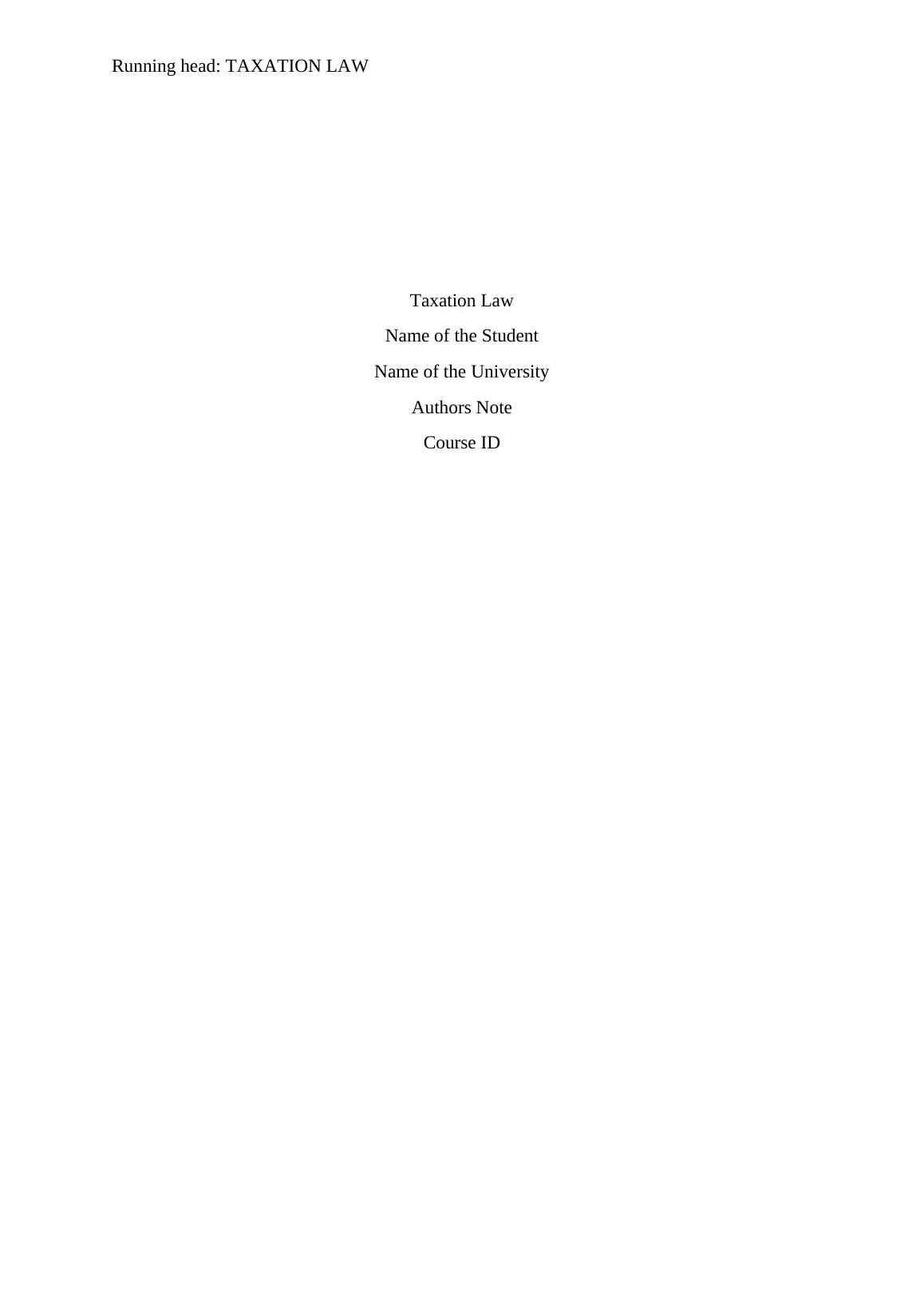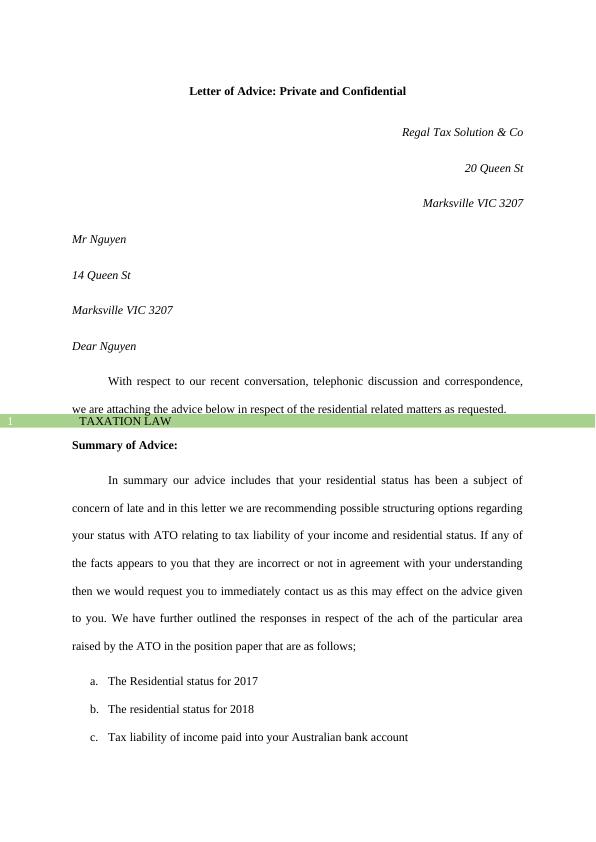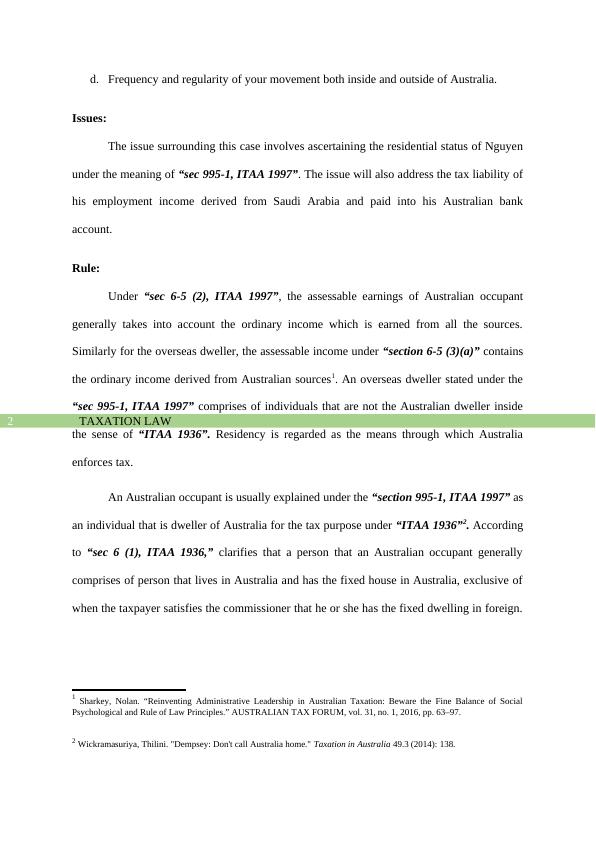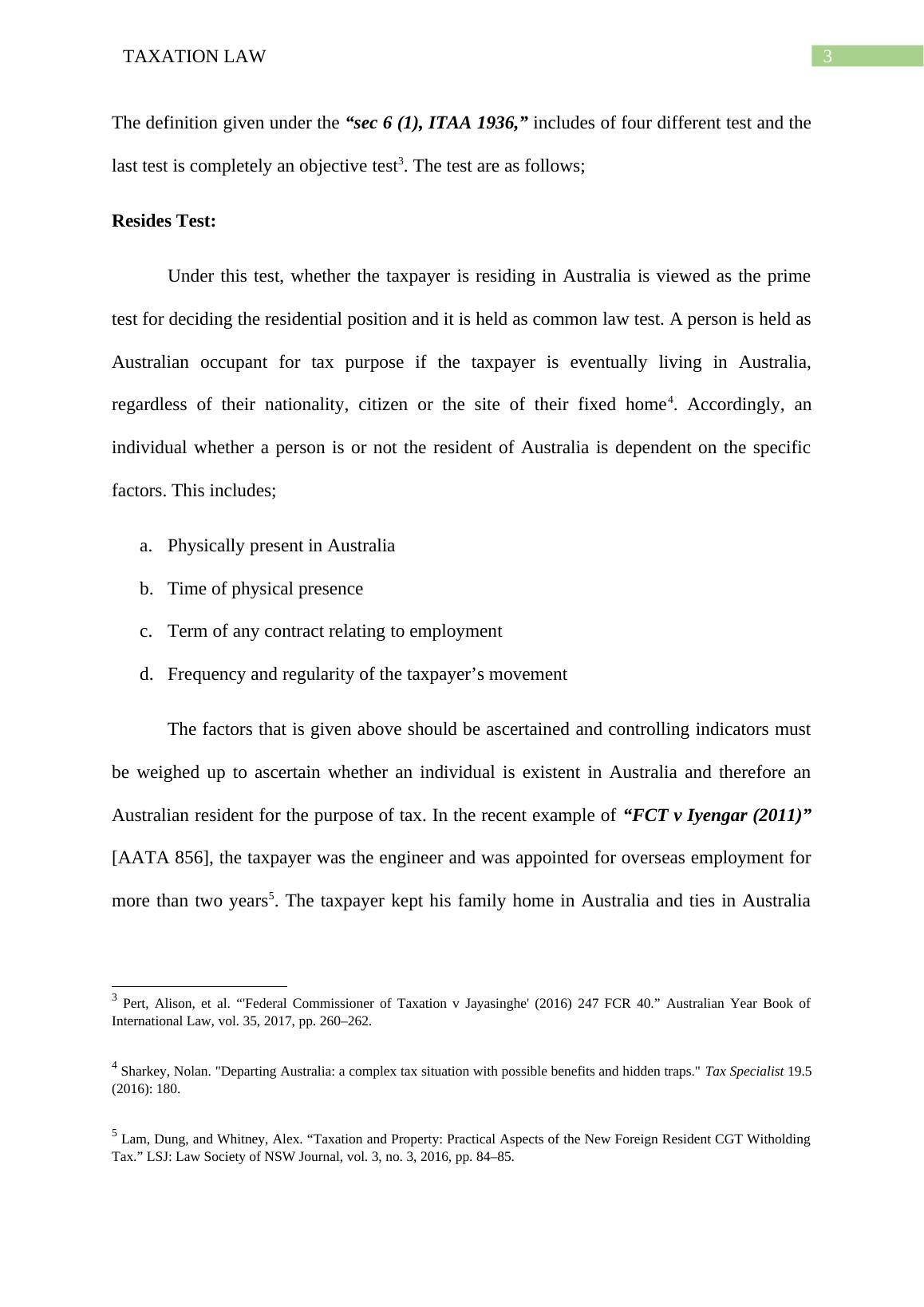Letter of Advice: Private and Confidential 2022
Analyzing the tax implications of a personal trainer's business and providing advice on trust deed changes.
11 Pages2543 Words57 Views
Added on 2022-10-04
Letter of Advice: Private and Confidential 2022
Analyzing the tax implications of a personal trainer's business and providing advice on trust deed changes.
Added on 2022-10-04
ShareRelated Documents
Running head: TAXATION LAW
Taxation Law
Name of the Student
Name of the University
Authors Note
Course ID
Taxation Law
Name of the Student
Name of the University
Authors Note
Course ID

TAXATION LAW1
Letter of Advice: Private and Confidential
Regal Tax Solution & Co
20 Queen St
Marksville VIC 3207
Mr Nguyen
14 Queen St
Marksville VIC 3207
Dear Nguyen
With respect to our recent conversation, telephonic discussion and correspondence,
we are attaching the advice below in respect of the residential related matters as requested.
Summary of Advice:
In summary our advice includes that your residential status has been a subject of
concern of late and in this letter we are recommending possible structuring options regarding
your status with ATO relating to tax liability of your income and residential status. If any of
the facts appears to you that they are incorrect or not in agreement with your understanding
then we would request you to immediately contact us as this may effect on the advice given
to you. We have further outlined the responses in respect of the ach of the particular area
raised by the ATO in the position paper that are as follows;
a. The Residential status for 2017
b. The residential status for 2018
c. Tax liability of income paid into your Australian bank account
Letter of Advice: Private and Confidential
Regal Tax Solution & Co
20 Queen St
Marksville VIC 3207
Mr Nguyen
14 Queen St
Marksville VIC 3207
Dear Nguyen
With respect to our recent conversation, telephonic discussion and correspondence,
we are attaching the advice below in respect of the residential related matters as requested.
Summary of Advice:
In summary our advice includes that your residential status has been a subject of
concern of late and in this letter we are recommending possible structuring options regarding
your status with ATO relating to tax liability of your income and residential status. If any of
the facts appears to you that they are incorrect or not in agreement with your understanding
then we would request you to immediately contact us as this may effect on the advice given
to you. We have further outlined the responses in respect of the ach of the particular area
raised by the ATO in the position paper that are as follows;
a. The Residential status for 2017
b. The residential status for 2018
c. Tax liability of income paid into your Australian bank account

TAXATION LAW2
d. Frequency and regularity of your movement both inside and outside of Australia.
Issues:
The issue surrounding this case involves ascertaining the residential status of Nguyen
under the meaning of “sec 995-1, ITAA 1997”. The issue will also address the tax liability of
his employment income derived from Saudi Arabia and paid into his Australian bank
account.
Rule:
Under “sec 6-5 (2), ITAA 1997”, the assessable earnings of Australian occupant
generally takes into account the ordinary income which is earned from all the sources.
Similarly for the overseas dweller, the assessable income under “section 6-5 (3)(a)” contains
the ordinary income derived from Australian sources1. An overseas dweller stated under the
“sec 995-1, ITAA 1997” comprises of individuals that are not the Australian dweller inside
the sense of “ITAA 1936”. Residency is regarded as the means through which Australia
enforces tax.
An Australian occupant is usually explained under the “section 995-1, ITAA 1997” as
an individual that is dweller of Australia for the tax purpose under “ITAA 1936”2. According
to “sec 6 (1), ITAA 1936,” clarifies that a person that an Australian occupant generally
comprises of person that lives in Australia and has the fixed house in Australia, exclusive of
when the taxpayer satisfies the commissioner that he or she has the fixed dwelling in foreign.
1 Sharkey, Nolan. “Reinventing Administrative Leadership in Australian Taxation: Beware the Fine Balance of Social
Psychological and Rule of Law Principles.” AUSTRALIAN TAX FORUM, vol. 31, no. 1, 2016, pp. 63–97.
2 Wickramasuriya, Thilini. "Dempsey: Don't call Australia home." Taxation in Australia 49.3 (2014): 138.
d. Frequency and regularity of your movement both inside and outside of Australia.
Issues:
The issue surrounding this case involves ascertaining the residential status of Nguyen
under the meaning of “sec 995-1, ITAA 1997”. The issue will also address the tax liability of
his employment income derived from Saudi Arabia and paid into his Australian bank
account.
Rule:
Under “sec 6-5 (2), ITAA 1997”, the assessable earnings of Australian occupant
generally takes into account the ordinary income which is earned from all the sources.
Similarly for the overseas dweller, the assessable income under “section 6-5 (3)(a)” contains
the ordinary income derived from Australian sources1. An overseas dweller stated under the
“sec 995-1, ITAA 1997” comprises of individuals that are not the Australian dweller inside
the sense of “ITAA 1936”. Residency is regarded as the means through which Australia
enforces tax.
An Australian occupant is usually explained under the “section 995-1, ITAA 1997” as
an individual that is dweller of Australia for the tax purpose under “ITAA 1936”2. According
to “sec 6 (1), ITAA 1936,” clarifies that a person that an Australian occupant generally
comprises of person that lives in Australia and has the fixed house in Australia, exclusive of
when the taxpayer satisfies the commissioner that he or she has the fixed dwelling in foreign.
1 Sharkey, Nolan. “Reinventing Administrative Leadership in Australian Taxation: Beware the Fine Balance of Social
Psychological and Rule of Law Principles.” AUSTRALIAN TAX FORUM, vol. 31, no. 1, 2016, pp. 63–97.
2 Wickramasuriya, Thilini. "Dempsey: Don't call Australia home." Taxation in Australia 49.3 (2014): 138.

TAXATION LAW3
The definition given under the “sec 6 (1), ITAA 1936,” includes of four different test and the
last test is completely an objective test3. The test are as follows;
Resides Test:
Under this test, whether the taxpayer is residing in Australia is viewed as the prime
test for deciding the residential position and it is held as common law test. A person is held as
Australian occupant for tax purpose if the taxpayer is eventually living in Australia,
regardless of their nationality, citizen or the site of their fixed home4. Accordingly, an
individual whether a person is or not the resident of Australia is dependent on the specific
factors. This includes;
a. Physically present in Australia
b. Time of physical presence
c. Term of any contract relating to employment
d. Frequency and regularity of the taxpayer’s movement
The factors that is given above should be ascertained and controlling indicators must
be weighed up to ascertain whether an individual is existent in Australia and therefore an
Australian resident for the purpose of tax. In the recent example of “FCT v Iyengar (2011)”
[AATA 856], the taxpayer was the engineer and was appointed for overseas employment for
more than two years5. The taxpayer kept his family home in Australia and ties in Australia
3 Pert, Alison, et al. “'Federal Commissioner of Taxation v Jayasinghe' (2016) 247 FCR 40.” Australian Year Book of
International Law, vol. 35, 2017, pp. 260–262.
4 Sharkey, Nolan. "Departing Australia: a complex tax situation with possible benefits and hidden traps." Tax Specialist 19.5
(2016): 180.
5 Lam, Dung, and Whitney, Alex. “Taxation and Property: Practical Aspects of the New Foreign Resident CGT Witholding
Tax.” LSJ: Law Society of NSW Journal, vol. 3, no. 3, 2016, pp. 84–85.
The definition given under the “sec 6 (1), ITAA 1936,” includes of four different test and the
last test is completely an objective test3. The test are as follows;
Resides Test:
Under this test, whether the taxpayer is residing in Australia is viewed as the prime
test for deciding the residential position and it is held as common law test. A person is held as
Australian occupant for tax purpose if the taxpayer is eventually living in Australia,
regardless of their nationality, citizen or the site of their fixed home4. Accordingly, an
individual whether a person is or not the resident of Australia is dependent on the specific
factors. This includes;
a. Physically present in Australia
b. Time of physical presence
c. Term of any contract relating to employment
d. Frequency and regularity of the taxpayer’s movement
The factors that is given above should be ascertained and controlling indicators must
be weighed up to ascertain whether an individual is existent in Australia and therefore an
Australian resident for the purpose of tax. In the recent example of “FCT v Iyengar (2011)”
[AATA 856], the taxpayer was the engineer and was appointed for overseas employment for
more than two years5. The taxpayer kept his family home in Australia and ties in Australia
3 Pert, Alison, et al. “'Federal Commissioner of Taxation v Jayasinghe' (2016) 247 FCR 40.” Australian Year Book of
International Law, vol. 35, 2017, pp. 260–262.
4 Sharkey, Nolan. "Departing Australia: a complex tax situation with possible benefits and hidden traps." Tax Specialist 19.5
(2016): 180.
5 Lam, Dung, and Whitney, Alex. “Taxation and Property: Practical Aspects of the New Foreign Resident CGT Witholding
Tax.” LSJ: Law Society of NSW Journal, vol. 3, no. 3, 2016, pp. 84–85.

End of preview
Want to access all the pages? Upload your documents or become a member.
Related Documents
Private and Confidential Pitcherslg...
|11
|2803
|14
Australian Taxation Law Caselg...
|11
|2554
|10
Taxation Law - Australia Studylg...
|9
|2010
|17
Taxation Law Issue Australia Question Answer 2022lg...
|14
|3588
|18
Taxation Lawlg...
|8
|1540
|20
Taxation Lawlg...
|10
|2114
|25
